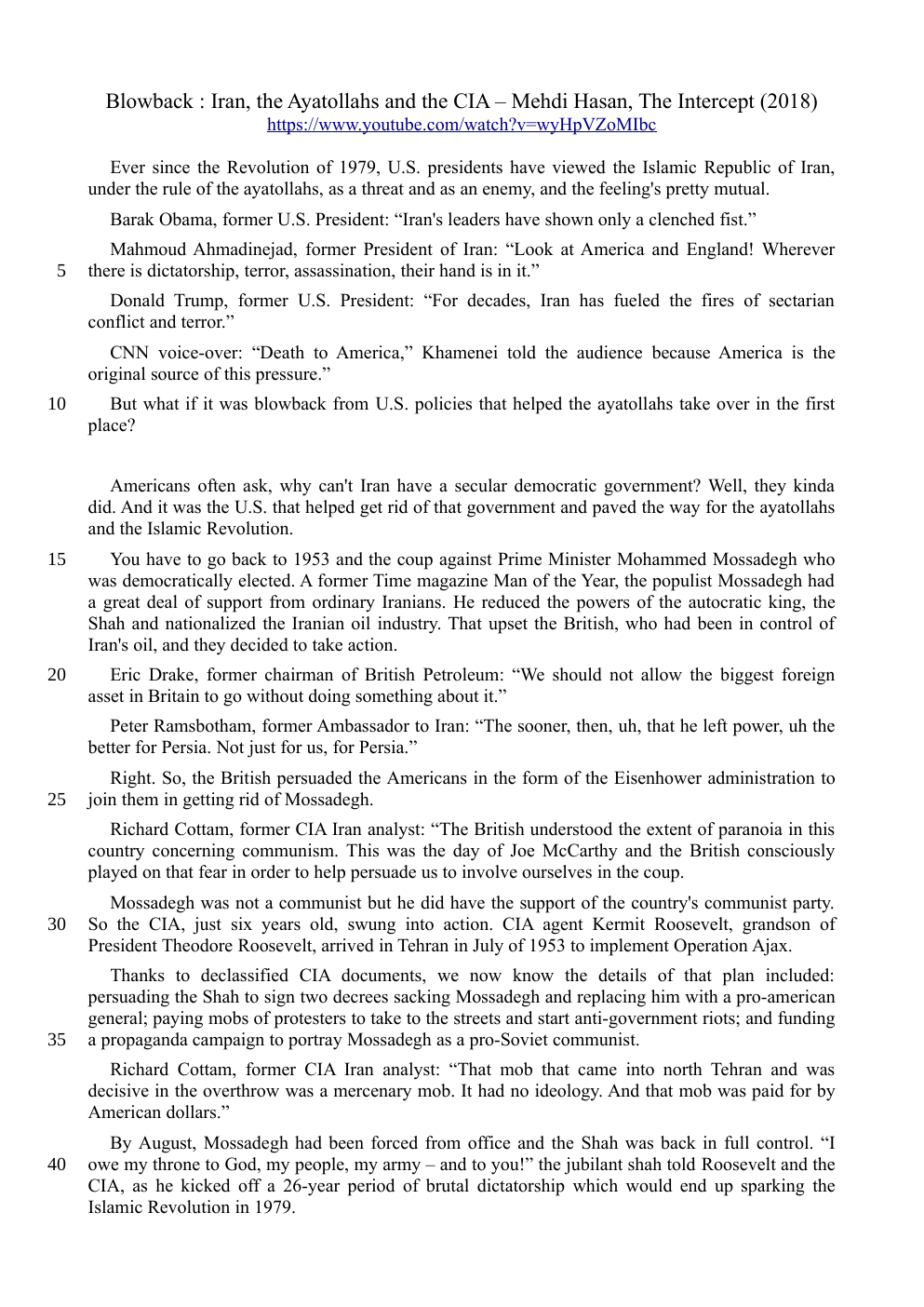Blowback : Iran, the Ayatollahs and the CIA – Mehdi Hasan, The Intercept (2018)
Publié le 08/03/2023
Extrait du document
«
Blowback : Iran, the Ayatollahs and the CIA – Mehdi Hasan, The Intercept (2018)
https://www.youtube.com/watch?v=wyHpVZoMIbc
Ever since the Revolution of 1979, U.S.
presidents have viewed the Islamic Republic of Iran,
under the rule of the ayatollahs, as a threat and as an enemy, and the feeling's pretty mutual.
Barak Obama, former U.S.
President: “Iran's leaders have shown only a clenched fist.”
5
Mahmoud Ahmadinejad, former President of Iran: “Look at America and England! Wherever
there is dictatorship, terror, assassination, their hand is in it.”
Donald Trump, former U.S.
President: “For decades, Iran has fueled the fires of sectarian
conflict and terror.”
CNN voice-over: “Death to America,” Khamenei told the audience because America is the
original source of this pressure.”
10
But what if it was blowback from U.S.
policies that helped the ayatollahs take over in the first
place?
Americans often ask, why can't Iran have a secular democratic government? Well, they kinda
did.
And it was the U.S.
that helped get rid of that government and paved the way for the ayatollahs
and the Islamic Revolution.
15
You have to go back to 1953 and the coup against Prime Minister Mohammed Mossadegh who
was democratically elected.
A former Time magazine Man of the Year, the populist Mossadegh had
a great deal of support from ordinary Iranians.
He reduced the powers of the autocratic king, the
Shah and nationalized the Iranian oil industry.
That upset the British, who had been in control of
Iran's oil, and they decided to take action.
20
Eric Drake, former chairman of British Petroleum: “We should not allow the biggest foreign
asset in Britain to go without doing something about it.”
Peter Ramsbotham, former Ambassador to Iran: “The sooner, then, uh, that he left power, uh the
better for Persia.
Not just for us, for Persia.”
25
Right.
So, the British persuaded the Americans in the form of the Eisenhower administration to
join them in getting rid of Mossadegh.
Richard Cottam, former CIA Iran analyst: “The British understood the extent of paranoia in this
country concerning communism.
This was the day of Joe McCarthy and the British consciously
played on that fear in order to help persuade us to involve ourselves in the coup.
30
35
Mossadegh was not a communist but he did have the support of the country's communist party.
So the CIA, just six years old, swung into action.
CIA agent Kermit Roosevelt, grandson of
President Theodore Roosevelt, arrived in Tehran in July of 1953 to implement Operation Ajax.
Thanks to declassified CIA documents, we now know the details of that plan included:
persuading the Shah to sign two decrees sacking Mossadegh and replacing him with a pro-american
general; paying mobs of protesters to take to the streets and start anti-government riots; and funding
a propaganda campaign to portray Mossadegh as a pro-Soviet communist.
Richard Cottam, former CIA Iran analyst: “That mob that came into north Tehran and was
decisive in the overthrow was a mercenary mob.
It had no ideology.
And that mob was paid for by
American dollars.”
40
By August, Mossadegh had been forced from office and the Shah was back in full control.
“I
owe my throne to God, my people, my army – and to you!” the jubilant shah told Roosevelt and the....
»
↓↓↓ APERÇU DU DOCUMENT ↓↓↓
Liens utiles
- The impact of social media on our societies through the changes in lifestyles, diversity and human rights.
- Encyclopedia of Philosophy: The Doubt and the Cogito - DESCARTES
- The Buddha of suburbia
- the stolen generation
- Is there one side of the coin in the myth of the frontier?

































